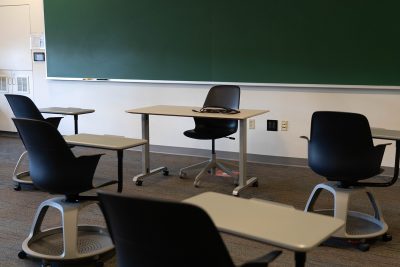
Boston University faculty and staff members who have disabilities and those in the Deaf and Hard of hearing community have had varied experiences throughout the pandemic — some have enjoyed increased flexibility, while others have found new restraints with online learning.
Kara Jackman, archivist and preservation librarian at the School of Theology library, said the pandemic has had a variety of positive effects for her.
The ability to work from home more often has decreased stress around her disabilities and helped her feel calmer about contracting COVID-19.
Jackman said the changes BU has instituted in regard to working from home has proved the possibility of these accommodations that people, such as herself, wanted prior to the pandemic.
“I like the flexibility,” Jackman said, “I like that I’m being treated like a human for once because of the pandemic.”
Jackman is also chair of the Staff and Faculty Extend Boston University Disability Support, or SAFEBUDS, which seeks to create a confidential space and community where faculty and staff with disabilities can share their experiences.
“Discuss how their work affects their disability,” she said, “and their disability affects their work.”
Jackson said SAFEBUDS is hosting events focused on building resilience for leaders across campus and providing tools to calm the stress of new workloads and fears that come with the pandemic.
“It’s stressful for everyone,” Jackman said, “but I feel like [for] folks with disabilities, it’s been that much more stressful.”
Linda Banks-Santilli, associate dean for academic affairs and clinical associate professor in the Wheelock College of Education and Human Development, wrote in an email people with mental disabilities and mental health-related conditions may be “suffering more with remote teaching.”
“Depression can be exacerbated by a decrease in socialization,” Banks-Santilli wrote. “Anxiety can be increased by the loss of familiar routines.”
Banks-Santilli wrote that ways to support “belonging and connection” through virtual platforms are possible — they are just different from that of in-person experiences.
For those in the Deaf and Hard of Hearing community, online learning has both benefits and downsides regarding communication and connection, said Emily Glenn-Smith, a lecturer in the Deaf Studies program in Wheelock.
Glenn-Smith, who is Deaf, said the ability to make use of an American Sign Language interpreter for all of her classes is helpful for communication because of the limited mobility of online teaching.
“We’re still teaching the same curriculum,” Glenn-Smith said, “but we’re using interpreters to make sure that the communication is as clear as possible.”
Because of the need for interpreters, Glenn-Smith said she is feeling a disconnect because of the lack of engagement that comes with teaching a visual language within Zoom’s limits.
“It’s been challenging for me because I don’t speak for myself,” Glenn-Smith said, “but I’m still limited in terms of the movement.”
She added online learning has not been more accessible for many members of the Deaf and Hard of Hearing community, but it is achievable.
“It depends on the deaf person, some might be oral, so that means that they lip read, they speech read, they speak for themselves,” Glenn-Smith said. “That would be more challenging because they may not be able to hear as well, they may not be able to lip read as well.”
Glenn-Smith also noted that the transition to in-person learning will cause more barriers for members of the Deaf and Hard of Hearing community.
“Half of our face being blocked by a mask is going to be a real hindrance,” she said, “and so I’m not sure how that’s going to work when we’re interacting with students.”



























































































































